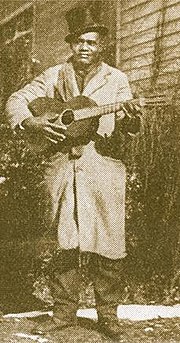
Blind Willie McTell was a Piedmont blues and ragtime singer and guitarist. He played with a fluid, syncopated fingerstyle guitar technique, common among many exponents of Piedmont blues. Unlike his contemporaries, he came to use twelve-string guitars exclusively. McTell was also an adept slide guitarist, unusual among ragtime bluesmen. His vocal style, a smooth and often laid-back tenor, differed greatly from many of the harsher voices of Delta bluesmen such as Charley Patton. McTell performed in various musical styles, including blues, ragtime, religious music and hokum.
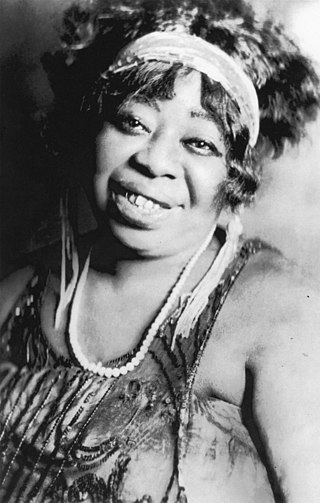
Gertrude "Ma" Rainey was an American blues singer and influential early blues recording artist. Dubbed the "Mother of the Blues", she bridged earlier vaudeville and the authentic expression of southern blues, influencing a generation of blues singers. Rainey was known for her powerful vocal abilities, energetic disposition, majestic phrasing, and a "moaning" style of singing. Her qualities are present and most evident in her early recordings "Bo-Weevil Blues" and "Moonshine Blues".
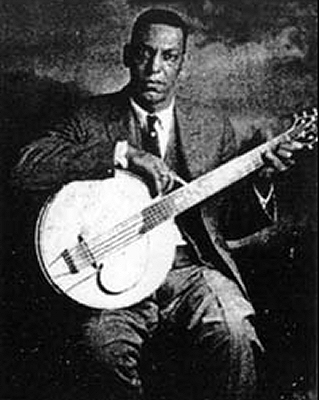
Papa Charlie Jackson was an early American bluesman and songster who accompanied himself with a banjo guitar, a guitar, or a ukulele. His recording career began in 1924. Much of his life remains a mystery, but his draft card lists his birthplace as New Orleans, Louisiana, and his death certificate states that he died in Chicago, Illinois, on May 7, 1938.
Roots 'N Blues: The Retrospective 1925-1950 is a four-CD box set released on Columbia Records in June 1992. The collection features about five hours of early blues, folk/country and gospel recordings from a variety of American artists. Many of these recordings had never previously been issued in any medium. The liner notes were written by Lawrence Cohn and Pete Welding.

Robert Hicks, better known as Barbecue Bob, was an early American Piedmont blues musician. His nickname was derived from his working as a cook in a barbecue restaurant. One of the three extant photographs of him show him playing a guitar and wearing a full-length white apron and cook's hat.

Ishmon Bracey, sometimes credited as Ishman Bracey, was an American Delta blues singer-guitarist. Alongside his contemporary Tommy Johnson, Bracey was a highly influential bluesman in Jackson, Mississippi, and was one of the area's earliest figures to record blues material. Bracey's recordings include "Trouble Hearted Blues" and "Left Alone Blues", both of which appear on several compilation albums.
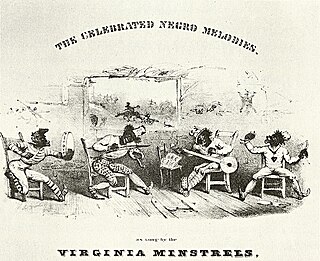
Hokum is a particular song type of American blues music—a song which uses extended analogies or euphemistic terms to make humorous, sexual innuendos. This trope goes back to early dirty blues recordings, enjoyed a huge commercial success in 1920s and 1930s, and is used from time to time in modern American blues and blues rock.
Kate McTell was an American blues musician and nurse from Jefferson County, Georgia. She is known primarily as the former wife of the blues musician Blind Willie McTell, whom she accompanied vocally on several recordings. She may have recorded as Ruby Glaze, but there is some uncertainty about whether she and Glaze were the same person, despite the fact that she claimed to be Glaze.

Coon songs were a genre of music that presented a stereotype of black people. They were popular in the United States and Australia from around 1880 to 1920, though the earliest such songs date from minstrel shows as far back as 1848, when they were not yet identified with "coon" epithet. The genre became extremely popular, with white and black men giving performances in blackface and making recordings. Women known as coon shouters also gained popularity in the genre.

Joshua Barnes Howell, known as Peg Leg Howell, was an American blues singer-songwriter and guitarist, who connected early country blues and the later 12-bar style. He was one of the first recorded artists of the Atlanta blues scene during the pre-war period, and he was also one of the first blues musicians to ever make a race record.
Christopher Allen Bouchillon was an American country music and blues musician from South Carolina, who is often credited with being the originator of the talking blues musical style.
The blue yodel songs are a series of thirteen songs written and recorded by Jimmie Rodgers during the period from 1927 to his death in May 1933. The songs were based on the 12-bar blues format and featured Rodgers’ trademark yodel refrains. The lyrics often had a risqué quality with "a macho, slightly dangerous undertone." The original 78 issue of "Blue Yodel No. 1 " sold more than a half million copies, a phenomenal number at the time. The term "blue yodel" is also sometimes used to differentiate the earlier Austrian yodeling from the American form of yodeling introduced by Rodgers.
Julius Daniels was an American Piedmont blues musician. His song "99 Year Blues" appeared on the box set Anthology of American Folk Music and has been covered by Jim Kweskin, Chris Smither, Johnny Winter, Charlie Parr and Hot Tuna on their album Burgers.

Burl C. "Jaybird" Coleman was an American country blues harmonica player, vocalist, and guitarist. He was a popular musical attraction throughout Alabama and recorded several sides in the late 1920s and early 1930s.
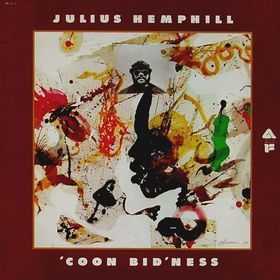
Coon Bid'ness is an album released by Julius Hemphill in 1975 on Arista featuring performances by Hemphill, Baikida Carroll, Abdul Wadud, Phillip Wilson, Arthur Blythe, Barry Altschul and Daniel Zebulon. The final track, "The Hard Blues," was recorded at the same recording session as Hemphill's debut album Dogon A.D.. After Hemphill's death in 1995, Freedom Records re-released the album as a CD under the name Reflections.
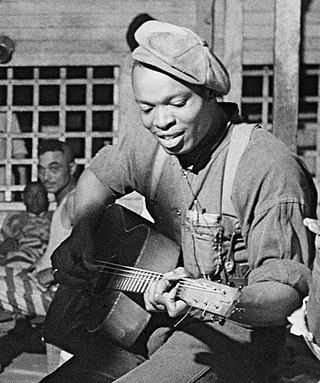
Eugene "Buddy" Moss was an American blues musician. He is one of two influential Piedmont blues guitarists to record in the period between Blind Blake's final sessions in 1932 and Blind Boy Fuller's debut in 1935. A younger contemporary of Blind Willie McTell, Curley Weaver and Barbecue Bob, Moss was part of a coterie of Atlanta bluesmen. He was among the few of his era whose careers were reinvigorated by the blues revival of the 1960s and 1970s.
Viola McCoy was an American blues singer who performed in the classic female blues style during a career that lasted from the early 1920s to the late 1930s.

Isaac Daniel (Dan) Hornsby was an American singer-songwriter, musician, recording artist, producer and arranger, studio engineer, band leader, artists and repertoire (A&R) man with Columbia Records, and radio personality.
Katherine Henderson was an American classic female blues singer. Most of her recording sessions took place in Long Island City, New York, in October and November 1928.
Ed Bell was an American Piedmont blues and country blues singer, guitarist and songwriter whose identity has only recently been verified by historians. Some of his records were released under the pseudonyms Sluefoot Joe and Barefoot Bill from Alabama. His best-remembered recording is "Mamlish Blues".
